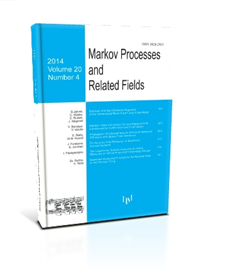Parrondo Games with Spatial Dependence and a Related Spin System
S.N. Ethier, Lee Jiyeon
2013, v.19, Issue 2, 163-194
ABSTRACT
Toral introduced so-called cooperative Parrondo games, in which there are $N\ge3$ players arranged in a circle. At each turn one player is randomly chosen to play. He plays either game $A$ or game $B$. Game $A$ results in a win or loss of one unit based on the toss of a fair coin. Game $B$ results in a win or loss of one unit based on the toss of a biased coin, with the amount of the bias depending on whether none, one, or two of the player's two nearest neighbors have won their most recent games. Game $A$ is fair, so the games are said to exhibit the Parrondo effect if game $B$ is losing or fair and the random mixture $C:=(1/2)(A+B)$ is winning. With $\mu^N_B$ (resp., $\mu^N_C$) denoting the mean profit per turn to the ensemble of $N$ players always playing game $B$ (resp., $C$), we give sufficient conditions for $\lim_{N\to\infty}\mu^N_B$ to exist and show that $\lim_{N\to\infty}\mu^N_C$ nearly always exists, with the limits expressible in terms of a parameterized spin system on the one-dimensional integer lattice. For a particular choice of the parameters, we show that the Parrondo effect (i.e., $\mu_B^N\le0$ and $\mu_C^N>0$) is present in the $N$-player model if and only if $N$ is even. For the same choice of the parameters, we show that, with a suitable interpretation and for certain initial distributions, the Parrondo effect is present in the spin system if and only if $N$ is even, $N$ being the number of consecutive players whose collective profit is tracked.
Keywords: Parrondo's paradox,cooperative Parrondo games,discrete-timeMarkov chain,stationary distribution,strong law of large numbers,interacting particle system,spin system,ergodicity,duality
COMMENTS
Please log in or register to leave a comment

